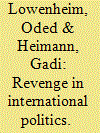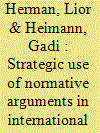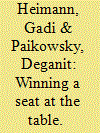|
|
|
Sort Order |
|
|
|
Items / Page
|
|
|
|
|
|
|
| Srl | Item |
| 1 |
ID:
096916


|
|
|
|
|
| Publication |
2010.
|
| Summary/Abstract |
The article has two main theses: first, that from 1958 to 1967-Charles de Gaulle's presidency-there was a typical patron-client relationship between France and Israel that lasted until the Six Day War. It challenges the frequent claim in the literature that relations between Israel and France did not essentially change after de Gaulle's rise to power. Second, it argues that the basis on which this relationship was founded was rocky from the start since as a client, Israel was not ready to accede to French demands that it restrain its security policy to conform to key French interests.
|
|
|
|
|
|
|
|
|
|
|
|
|
|
|
|
| 2 |
ID:
181029


|
|
|
|
|
| Summary/Abstract |
This article seeks to explain states’ success, either full or partial, in obtaining a place in an exclusive managerial forum and the managerial privileges this entails. We argue that the ability to join an exclusive forum and gain these privileges depends on three factors: the extent to which the potential junior partners’ assets seem attractive to the forum’s leaders; the extent of potential junior partners’ solidarity with the leading powers; and the leading powers’ ability to obtain legitimacy for including new members from the other states subject to the authority of the forum. These arguments are demonstrated through an examination of two test cases: the United Kingdom’s partial success in achieving integration at the end of the 1940s by gaining informal privileges from the United States, and France’s failure to gain institutionalized integration a decade later and its refusal to be satisfied with informal privileges.
|
|
|
|
|
|
|
|
|
|
|
|
|
|
|
|
| 3 |
ID:
085120


|
|
|
|
|
| Publication |
2008.
|
| Summary/Abstract |
This paper conceptualizes the phenomenon of revenge in international politics and seeks to specify the conditions that increase or diminish the tendency of states to take revenge against enemies. We situate the discussion of revenge within the broader context of emotions in IR. We argue that whether or not a state will take revenge depends on the combinations of three interrelated and mutually constitutive variables: (1) the degree to which a state emotionally experiences harm against it as morally outrageous, (2) the extent of humiliation the harmed state feels, and (3) the degree to which international retaliation is institutionalized by rules and laws that govern the use of cross-border force. We examine the Second Lebanon War (July 2006) as a case of revenge in international politics.
|
|
|
|
|
|
|
|
|
|
|
|
|
|
|
|
| 4 |
ID:
178124


|
|
|
|
|
| Summary/Abstract |
This article claims that normative arguments play a greater role in negotiations than existing scholarship implies. While the approaches of communicative and rhetorical action limit the use of arguments to environments that meet certain conditions, in fact normative arguments are widely used and can be found in almost every example of negotiations. This article seeks to explain this phenomenon. Negotiating parties that feel obligated to tackle normative arguments raised by the opposing side – either because of the presence of an audience or to maintain its reputation – have a number of tools at their disposal. Negotiators who are unsuccessful in tackling these arguments will tend to offer a proposal that is more attractive to the other side. Although normative arguments do not generally have a sweeping influence on the outcome of negotiations, they are still likely to play a significant role. The article applies this theoretical framework to the case of the lengthy negotiations between the EEC and Israel, in which the former had no material motivation and desire to cede to Israel’s demands and nevertheless did so.
|
|
|
|
|
|
|
|
|
|
|
|
|
|
|
|
| 5 |
ID:
139575


|
|
|
|
|
| Summary/Abstract |
The article illuminates the International Relations (IR) enigma of how states with relative low power succeed in gaining privileges reserved for great powers. Many IR studies on status stress the importance of social recognition as a precondition for enjoying the status of a great power. However, very few focus on the factors that affect such recognition. This article tries to fill this gap by looking at systemic wars. Systemic wars are special circumstances wherein a new world order is built and privileges are redistributed among states. In these situations, states may use their symbolic, moral, and circumstantial assets to grant themselves a paramount role in the new order. A state's previous status as a great power, its contribution to victory in a war, and the utilitarian considerations of other countries are all assets that help it to win the privileges reserved for great powers – and that in the long run could gain it recognition as a great power, despite its lack of the requisite capabilities. By using this conceptual framework in the case of France during and after the Second World War, this article tries to explain how a relatively weak power can gain a leading role in a postwar order.
|
|
|
|
|
|
|
|
|
|
|
|
|
|
|
|
| 6 |
ID:
181536


|
|
|
|
|
| Summary/Abstract |
International Relations scholars and practitioners commonly agree that relationships in world politics are managed impersonally. Personal connections between agents of states are perceived as having only little impact on foreign policy of states. The current article challenges this impersonal ethos, suggesting that personal relationships play an important role in conducting, and thus understanding, interstate relations. Interviews conducted with 21 senior Israeli officials concerning mundane professional practices reveal three elements that are essential for successful statecraft: acknowledging the power of interpersonal relations; substantive knowledge of counterparts; and the excellent communicative competencies needed to realize the potential of personal connections. We argue that statespersons’ behavior can be located on an impersonal-interpersonal continuum. Furthermore, we suggest explanations for deviations from the impersonal ethos and discuss the role of interpersonal practices in managing interstate relations. At the very least, the personal aspect should be taken into consideration when examining foreign policy. However, personal relations may have a highly significant impact on interstate interactions, thus requiring a revision of the current paradigm in IR, which marginalizes the personal aspect.
|
|
|
|
|
|
|
|
|
|
|
|
|
|
|
|
| 7 |
ID:
188612


|
|
|
|
|
| Summary/Abstract |
Established powers enjoy privileges in world politics coveted by emerging powers. These privileges vary in their level of institutionalization: full formal privileges, partial formal privileges, and informal privileges. We identify two alternative strategic routes through which emerging powers target these three types of privileges: a top-down and a bottom-up route. We analyze two factors that impact the choice between these two routes: restrictiveness of eligibility criteria for winning privileges, and the expected levels of opposition by both established powers and outsiders. We examine the impact of these factors on two cases in which India negotiated privileges: India’s top-down campaign to win a permanent seat on the UN Security Council; and India’s bottom-up campaign to enter the nuclear club as a de facto nuclear weapon state. Highly restrictive eligibility criteria along with high levels of opposition drove India to gradually seek nuclear privileges through a bottom-up route.
|
|
|
|
|
|
|
|
|
|
|
|
|
|
|
|
|
|
|
|
|